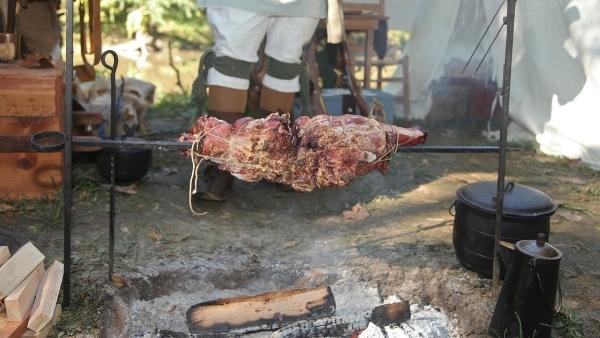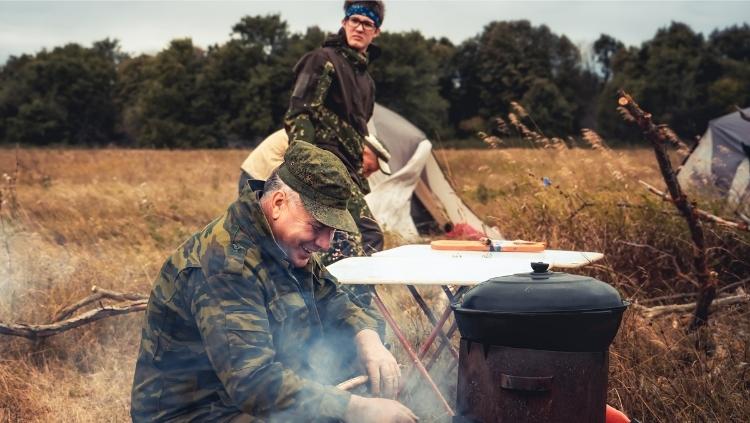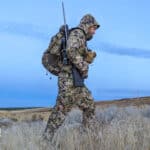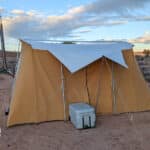In days gone by, when the expansion west was beginning, there was little question that game harvested was used on a regular basis as a source of protein. Today the answer to the question “do hunters eat what they kill” has become more a question of legalities and ethics.
To be clear, my stance is that I only harvest what I can and will use, and I never leave the game in the field for the pure sport of killing. Taking a game to simply harvest its head and leave the meat to rot is the most serious ethical and legal violation.
In most cases, hunters eat what they kill. Not only is it considered the ethical thing to do, but regulations usually require that a maximum of edible meat from a game animal be harvested and preserved for human consumption. Wanton waste of an animal is frowned upon by the hunting community.
Local Regulations Set Standards for Harvesting Game Meat
We must look at the game and fish laws state to state to get a real handle on what is required by law.
As an example, let’s say someone kills a deer in a state that legally requires only the quarters, backstraps, and inner loins to be salvaged from the deer. In addition, let’s say that the hunter also salvages the neck meat (which in many cases is left on the carcass) but leaves the ribs in the field because there’s not much meat on them. Most of us will agree at this point that the hunter has fulfilled their legal and moral obligation for salvaging meat.
However, it would be different if you put that same hunter in the field in Alaska. If they salvage the same meat as in the first case (leaving the rest), they’d be guilty of wanton waste. Also, Alaska requires that meat from a carcass be transported back to your camp before the head can be taken from the field. This assures meat is harvested and transported out of the field before the head of the animal.
What is the point? There are different standards and regulations for different situations and locations.
Parts of Animals That Commonly Go to Waste
In reality, most hunters leave edible parts of animals in the woods or on the mountain. This may include head meat, organs, tongue, stomach, and intestines. Most state wildlife agencies do not require the removal of internal organs for human consumption, although many hunters take organs such as the liver for table fare.
While it may vary state to state as to the laws concerning wanton waste, the location of where you are is a factor in salvaging the carcass.
For example, many years ago, I spent some time in Africa (Zambia) hunting. Obviously, it is impractical (and most likely not legal) to bring meat back from overseas. All of the species I harvested in Africa, from Cape Buffalo to Zebra to Hartebeest, the meat was used in its entirety by the native people. They wasted nothing.
Average Amount of Meat Harvested from Common Big Game Animals
The following table gives you some idea of the meat yield of certain ungulates (hoofed mammals) here in the US. These numbers, of course, can vary based on the actual live weight of the animal in the field.
| Animal | Approximate Animal Weight | Meat Yield |
| Mule Deer Buck | 200 pounds | 65 pounds |
| Whitetail Deer Buck | 150 pounds | 53 pounds |
| Bull Elk | 700 pounds | 200 pounds |
| Bull Moose | 1250 pounds | 425 pounds |
| Bison | 1150 pounds | 600 pounds |
| Whitetail Deer Doe | 100 pounds | 40 pounds |
| Mule Deer Doe | 165 pounds | 57 pounds |
| Cow Elk | 500 pounds | 155 pounds |
The table above demonstrates big game meat yields here in the US. Most folks consider these species as the primary game taken for human consumption.
Many other game species, from predators to furbearers to small game and fish, are commonly hunted and harvested for table fare.
Predators and Furbearers
Exceptions to whether hunters eat what they kill come when we begin discussing predatory species, such as bear or mountain lion, and furbearers (fox, beaver, bobcat, etc.).
The meat from these species is not required to be removed by law in many states. Why? Many do not consider meat from these species as optimal for human consumption. Although any of these animals are certainly usable for protein.
You may ask, are there any safety concerns when eating a predatory animal? The short answer is there can be.
Big Cats
Like wild pigs and bears, big cats can be carriers of Trichinella spiralis, the roundworm that causes trichinosis in humans. In nature, only the flesh of meat-eating animals like bears and mountain lions is known to sometimes carry trichinella. The meat of plant-eaters, such as deer and elk, does not. Contamination is easily prevented by cleaning knives and cutting surfaces after processing and cooking to an internal temperature of at least 165 degrees Fahrenheit.
The most common description I hear of both the mountain lion and the bobcat is that it tastes like lean pork. The flavor is mild, almost bland as far as game meat goes.
Because of the mild flavor, the meat from large cats takes seasoning well. Any of your favorite seasoning blends and cooking methods for chicken or pork will work well with cats. Overnight brining in saltwater before cooking also adds moisture to the finished meal, a technique often used for all wild game.
Bear
Bear meat, as mentioned, has the same issue of causing possible trichinosis, and therefore thorough cooking is a must. Nonetheless, it is commonly consumed, even considered a delicacy, by hunters.
Most bear meat for consumption is used in sausage, stews, and kebabs.
The moral of the story: if you are going to utilize meat from species considered furbearers or predatory, you should follow proper cooking protocols.
Small Game, Fowl, and Fish
Species included in this category would consist of rabbits, squirrels, all game birds (quail, pheasant, dove, waterfowl, etc.), and all fish species.
Fish
While I love to fish and enjoy a good fish fry once in a while, I am not a huge fish eater. The beauty with fishing is I can catch the fish and then release that same fish to be caught again another day. Keep in mind that you are certain to occasionally kill a fish that swallows a hook, at which time I will take that fish home for consumption.
Small Game
Small mammals such as squirrels and rabbits (especially cottontails) can be excellent table fare. But as with any wild animal, precautions should be taken. Rabbits especially can be the carriers of rabbit fever, but more properly known as Tularemia.
Tularemia is caused by infection with the bacterium Francisella tularensis, which is found in small mammals such as rodents and rabbits, and arthropods, such as ticks. The bacterium that causes tularemia is most often transmitted to humans by a tick or biting fly bite, handling of an infected animal, or inhalation or ingestion of the bacterium.
My rule of thumb for cottontail and squirrels, hunt them only in the coldest part of the year and cook thoroughly.
Game Birds
As to game birds, some are better table fare than others. Quail and pheasant tend to be on the top of the choice menu more than say duck or dove.
Do not get me wrong. I have had my fair share of duck, geese, sandhill crane, and dove. The darker meat of these migratory birds that fly great distances requires more creative recipes to get high marks on the flavor scale, at least for me.
Hunters Eat What They Kill

There are, of course, endless recipes for all manner of wild game. In my estimation, you can never go wrong in turning wild game into jerky or sausage. Search out, veteran hunters. They will provide you with excellent recommendations for turning your game harvest into a first-rate meal.
The bottom line is, yes, hunters eat what they kill. They utilize meat from what they kill in most instances. And they salvage the meat where required by law.
I have an almost endless list of friends that are always on the lookout for some wild game for the freezer. Most years, I happily share game that I have taken during the fall and winter seasons. I do not believe in wasting game. I’m sure you don’t either.
Our forefathers depended on wild game to survive. As a hunter not only is it ethical, but it is your responsibility to make good use of the animal you harvest. To do otherwise is a dishonor to the hunting community and the animal itself.
Recommended reading: Is Fishing More Ethical Than Hunting?












